Sigma Xi Distinguished Lecturers, 2021–2022
Potential hosts should contact lecturers directly to book events. In making arrangements, hosts should be specific about dates, lecture topic, scope of the lecturer's visit and any special accommodations that may be called for.
Each lecturer has designated his or her topic(s) for three different types of audiences. Where more than one level is shown, the lecture can be adjusted to the needs of the audience:
- P (Public)
Aimed at presenting scientific issues of general concern to a public audience.
- G (General)
Intended for a normal Sigma Xi audience of both scientists and other scholars representing a broad range of disciplines.
- S (Specialized)
Aimed at scientists and students in fields that are closely related to that of the lecturer.
Jump to:
Julie Demuth (American Meteorological Society)
.bmp?sfvrsn=bd1cb758_0&MaxWidth=148&MaxHeight=&ScaleUp=false&Quality=High&Method=ResizeFitToAreaArguments&Signature=EB7EFCB79DB7B1D50FEA7885CA606A40) Project Scientist II
Project Scientist II
National Center for Atmospheric Research (NCAR)
Mesoscale & Microscale Meteorology Lab (MMM)
Email
Phone: 303-497-8112
Web
- Understanding Public Risk Perceptions
and Responses for Improved Tornado Risk
Communication (P, G, S)
- A Longitudinal Analysis of People’s Risk Perceptions and
Responses During a Real-World Hurricane Threat (S)
Julie Demuth, PhD, is a Project Scientist at the National Center for Atmospheric Research (NCAR) in the Mesoscale and Microscale Meteorology (MMM) Lab with the Weather Risks and Decisions in Society (WRaDS) research group. She has been working for 15 years on integrating social science research with the meteorological research and practitioner communities. With a hybrid background in atmospheric science and in communication, Julie conducts research on hazardous weather risk communication, risk perceptions, and responses. She conducts her research both with experts—including weather forecasters, emergency managers, and other government officials—and members of the public. Her work centers on understanding how forecast information, in conjunction with other factors, influence what people think and feel and how they respond. Some of Julie’s current work includes: (1) studying how people’s past hazardous weather experiences affect how they perceive future weather risks; (2) analyzing longitudinal survey and Twitter data to understand how people’s risk assessments change as hurricane and tornado threats unfold; (3) exploring people’s perspectives on probabilistic tornado warnings; and (4) identifying National Weather Service forecasters’ interpretations of and needs for guidance from numerical weather prediction model ensembles and from artificial intelligence / machine learning output. Prior to being at NCAR, Julie worked for three years in Washington DC as a Program Officer at the National Academies of Sciences, Engineering, and Medicine for the Board on Atmospheric Sciences and Climate. Julie received her BS in meteorology from the University of Nebraska-Lincoln, her MS in atmospheric science from Colorado State University, and her PhD in public communication and technology from Colorado State University.
Andrew Fisher
Professor, Hydrogeology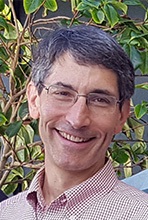
Earth and Planetary Sciences Department
University of California at Santa Cruz
Email
Phone:831-459-5598
Web
- Mapping, Modeling, Measuring and Monetizing Enhanced Groundwater Recharge with Stormwater (P, G, S)
- Subseafloor Experiments and Models Reveal Complex Patterns of Coupled Fluid-Heat-Solute Transport Through the Ocean Crust (P, G, S)
Andrew Fisher is a Professor of Earth and Planetary Sciences at UCSC, where he is also affiliated with departments of Environmental Studies, Microbiology and Environmental Toxicology, and Ocean Sciences. He is the UCSC Director for UC Water, co-PI for the Center for Dark Energy Biosphere Investigations, and founder of The Recharge Initiative (www.rechargeinitiative.org), a focused effort to protect, enhance, and improve the availability and reliability of groundwater resources. Fisher teaches classes in geology, hydrology, groundwater, and groundwater modeling, and conducts research on: surface water – groundwater interactions, managed recharge, geothermics, marine hydrothermal circulation, coupled flows (fluid-heat-solutes), water quality, and development of new hydrologic tools and techniques. He has served on numerous technical advisory committees for agencies, municipalities, and NGOs. Fisher earned a B.S. in Geology from Stanford University, and a Ph.D. in Marine Geology and Geophysics from the University of Miami. He is a Fellow of the American Geophysical Union and the Geological Society of America (GSA), received the O. E. Meinzer Award in Hydrogeology from the GSA. and is a two-time recipient of Excellence in Teaching Awards from UC Santa Cruz .
Agustin Fuentes
Professor of Anthropology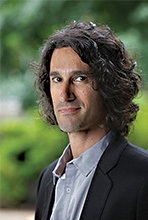
Princeton University
Email
Phone: 609-258-4549
Web
- Why We Believe: Evolution and the Human Way of Being (P, G)
- The Creative Species: Imagination and Collaboration in Human Evolution (P, G)
- What Race Is, and What It is Not …And Why It Matters (P, G, S)
Agustín Fuentes, trained in Zoology and Anthropology, is the Edmund P. Joyce C.S.C. Professor of Anthropology at the University of Notre Dame. His research delves into the how and why of being human. Ranging from chasing monkeys in jungles and cities, to exploring the lives of our evolutionary ancestors, to examining what people actually do across the globe, Professor Fuentes is interested in both the big questions and the small details of what makes humans and our closest relatives tick. He has published more than 150 peer reviewed articles and chapters, authored or edited 19 books and a three-volume encyclopedia, and conducted research across four continents and two-million years of human history. His current explorations include the roles of creativity and imagination in human evolution, multispecies anthropology, evolutionary theory, and the structures of race and racism. Fuentes is an active public scientist, a well-known blogger and lecturer, and a writer and explore for National Geographic. Fuentes’ recent books include “Race, Monogamy, and other lies they told you: busting myths about human nature” (U of California), “Conversations on Human Nature(s)” (Routledge), “The Creative Spark: how imagination made humans exceptional" (Dutton), and “Why We Believe: evolution and the human way of being” (Yale).
Sir Christopher Lange
Professor of Radiation Oncology, College of Medicine
Professor of Molecular & Cell Biology, School of Graduate Studies
Director of Radiation Research and Radiation Biology
Associate Director of Radiation Oncology Residency Program
State University of New York, Downstate Medical Center
Email
Phone: 718-270-1050
- Stem Cells & Regeneration: A Quantitative Explanation of Organismal Survival (G, S)
- Cancer Stem Cells: The Key to Individualization of Cancer Therapy (G, S)
- Mammalian Chromosome Structure in Interphase (S)
Prof. Lange’s entire career has dealt with understanding the mechanisms of how ionizing radiations affect molecules (especially DNA and the induction and repair of double strand breaks), how the kinetics of those changes affect cell survival and how changes in cell survival determine the survival of tissues, organisms, and tumors. This has led to many seminal works, often more than a decade ahead of the field. These studies have also shown the importance of radiation research in many other fields of science (physiology, cell biology, structural biology, genetics, biophysics, polymer physical chemistry, etc.) and medicine (radiation oncology, sonography, etc.).
Upon graduation from MIT (1961) with an S.B. in Physics (minors in Biology, Chemistry and Philosophy and thesis in Alex Rich’s lab on x-ray crystallography – isolation from rabbit muscle, crystallization and unit cell determination of diphosphofructo aldolase), Lange went to Oxford University, where he worked in Frank Ellis’ Radiation Therapy Department in the Churchill Hospital, as a Medical Research Council Research Assistant, and subsequently at the Paterson Laboratories of the Christie Hospital & Holt Radium Institute in Manchester, as a tenured Research (later Senior Research) Officer in the National Health Service, in both places under the tutelage of Professor Laszlo G. Lajtha ( a founder of the field of stem cell kinetics; later CBE). Lange received his doctorate from Oxford University (D.Phil., Fac. Med.) in 1968.
Lange also became a Professor of Physiology & Biophysics and then of Molecular & Cell Biology in the SUNY Downstate School of Graduate Studies (1992- ), Associate Director of the Radiation Oncology Residency Program (1998- ), and Associate Chair of Radiation Oncology (2010-2016).
Lange has been honored with several awards, including: (1) The Knight’s Cross, Order of Merit, Republic of Poland (KCOM), awarded by the President of Poland (11/21/2004) for outstanding contributions to Polish Science and Education; (2) an Honorary Lifetime Consultantship to the Swietokrzyskie Centrum Onkologii, Poland (2005); (3) named Scientific Advisor to the New York State Assembly (13th and 16th ADs; 2010); (4) election to the Board of Directors (1999-2005) and the Executive Committee (2002-05), of Sigma Xi, The International Scientific Research Honor Society; (5) the Presidential Certificate of Gratitude for Contributions to Science, Faculty of Science Presidential Distinguished Lecturer, Hirosaki University, Japan (1979); and (6) election as an Honorary Member, Omicron Delta Epsilon (International Economics Honor Society) (1978). Lange is a biographee of many Who’s Whos, and since 2006, annually, of Marquis’s Who’s Who in the World. In 2017 Lange received the Marquis Who's Who Lifetime Achievement Award. He also serves as a referee for 28 professional journals.
Kristie Macrakis
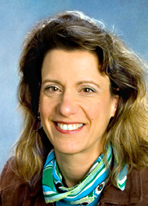 Professor and Director of Graduate Studies
Professor and Director of Graduate Studies
Georgia Institute of Technology
Email
Phone: 404-894-2185
Web
- Passing the Global Espionage Torch: How Britain Helped the US Expand its Eavesdropping Capabilities (P, G)
- Our Machine in Havana: How We Really Found Missiles on Cuba (P, G)
- Invisible Ink Revealed (S)
Kristie Macrakis is Professor and Director of Graduate Studies in the School of History and Sociology at Georgia Tech. She received her PhD in the history of science from Harvard University. Her recent work focuses on the intersection of espionage history and history of technology, but she has also worked at the intersection of German history and history of science and technology. She is the author or editor of five books including Surviving the Swastika (Oxford University Press), Seduced by Secrets (Cambridge University Press) and Prisoners, Lovers and Spies (Yale University Press). Her books have been translated into German, Czech, Slovak, Estonian, Chinese and Italian. She is completing a book tentativly entitled: Techno-Spy Empire: How American's Love Affair with Technology Created a Global Espionage Power. She is also the author of over 30 articles as well as popular magazine articles, book reviews and op-eds. Her work has appeared in Newsweek, the Washington Times, Nature, Science and American Scientist. She has made dozens of media appearances including interviews on the History Channel, Science Friday, NPR, and the Smithsonian Channel. In addition to scores of academic lectures, she has spoken at places like the Harvard Club, the International Spy Museum, the Carter Center and appeared on C-SPAN. Macrakis’s awards include fellowships from the Institute for Advanced Study, Princeton, Fulbright and the Wilson Center as well as grants from the National Science Foundation and the Humboldt Foundation.
Oge Marques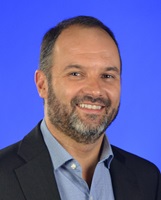
Professor, Computer Science and Engineering
Florida Atlantic University
Email
Phone: 561-866-7144
Web
- Can You Trust What You See? The Magic of Visual Perception (P, G, S)
- Advancements in Artificial Intelligence (AI): Technology, Risks, Applications< and Implications (P, G, S)
- The Artificial Intelligence (AI) Revolution in Medicine (P, G, S)
Oge Marques is a Professor of Computer Science and Engineering in the College of Engineering and Computer Science and, by courtesy, a Professor of Information Technology in the College of Business at Florida Atlantic University (FAU) (Boca Raton, FL). He received his PhD in Computer Engineering from FAU in 2001 and a Master’s in Electronic Engineering from Philips International Institute (the Netherlands). He is a world-renowned expert in the area of intelligent processing of visual information, which encompasses the fields of image processing, computer vision, human vision, artificial intelligence (AI) and machine learning. His current research focuses on the intersection of AI and medicine. He is the author of ten technical books, one patent, and more than a hundred scientific articles in his fields of expertise. He has more than 30 years of teaching experience in different countries (USA, Austria, Brazil, Netherlands, Spain, France, and India). Dr. Marques is a Fellow of the Leshner Leadership Institute of the American Association for the Advancement of Science (AAAS), and a Senior Member of both the IEEE (Institute of Electrical and Electronics Engineers) and the ACM (Association for Computing Machinery). He is also a Tau Beta Pi Eminent Engineer and a member of the honor societies of Sigma Xi, Phi Kappa Phi and Upsilon Pi Epsilon. He has won several teaching awards, including: the Engineers’ Council John J. Guarrera Engineering Educator of the Year Award (2019), the Outstanding Mid-Career Teaching Award, American Society for Engineering Education - Southeastern Section (ASEE-SE) (2011), and the Excellence and Innovation in Undergraduate Teaching Award, FAU, three times (2018, 2011, 2004). He speaks Portuguese, Spanish, and French. In his spare time, he enjoys traveling, watching soccer, listening to jazz, and reading philosophy and psychology books. He lives in South Florida with his wife.
Heather McKillop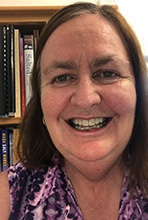
Thomas & Lillian Landrum Alumni Professor
Louisiana State University
Email
Phone: 225-578-6178
Web
- Submerged Ancient Maya Salt Works, Belize (G, S)
- Using 3D Technology in Underwater Maya Archaeology at the Paynes Creek Salt Works, Belize” (G, S)
- Sea-level Rise Submerged Ancient Maya Coastal Sites (S)
- Salt Production and the Ancient Maya Marketplace Economy (G, S)
- Ancient Maya Canoe Travel and Sea Trade (G, S)
Heather McKillop has carried out archaeological research on the ancient Maya on the coast, offshore
islands, and underwater since 1979. She earned her MA at Trent University (Canada) and her PhD in
Anthropology at the University of California-Santa Barbara. Since the discovery of the wooden buildings and objects preserved in peat below the seafloor in 2004, she has focused her research on discovery, mapping, and excavations of wooden buildings with briquetage associated with a massive salt industry.
She established the Digital Imaging and Visualization in Archaeology (DIVA) lab for 3D digital imaging
and printing of waterlogged and other fragile materials. She is a lecturer for the Archaeological Institute of America, and was awarded an LSU Distinguished Professor Award, and honored at half-time with a video tribute at an LSU football game.
David Pfennig
Professor, Department of Biology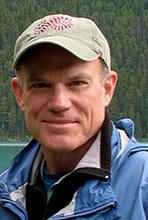
The University of North Carolina at Chapel Hill
Email
Phone: 919-306-5144
Web
- Plasticity, Epigenetics, and Evolution (P, G)
- Life Imitating Life: The Evolution of Mimicry (P, G, S)
- Phenotypic Plasticity and the Evolutionary Origins of Novel Traits (S)
David Pfennig is an evolutionary biologist at The University of North Carolina at Chapel Hill. He received two BS degrees (in Zoology and Geology) and a Ph.D. from the University of Texas at Austin. His research focuses on how the interplay between evolution, ecology, and development shapes biodiversity. He has published over 130 technical articles (including in Nature and Science) as well as a scholarly monograph, Evolution’s Wedge (co-authored with Karin Pfennig). His research has been funded continuously since 1994 by the National Science Foundation and has been featured in The New York Times, Newsweek, National Geographic, Scientific American, New Scientist, and Discover. He is a contributing author to Scientific American and has appeared on television on BBC/PBS’s Nature series (twice) as well as on National Geographic TV and KUAT’s “The Desert Speaks”. He has spoken at over 85 universities and at dozens of museums, civic groups, and K-12 schools.
Luisa Rebull
Associate Research Scientist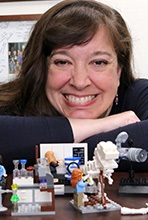
California Institute of Technology-IPAC
Email
Phone: 626-395-4565
Web
- More Than Your Eyes Can See: Infrared Light (P)
- Getting Your Hands on Real Astronomy Data (P, G, S)
- Stellar Rotation in Clusters with K2 (S)
Dr. Rebull is an observational stellar astronomer. She studies how stars form and how stars rotate as a function of mass and age. Dr. Rebull works for NASA's long-wavelength astrophysics archive, IRSA, which help curate data and archive data from ongoing missions. She helps create and maintain the archives and help astronomers (and educators/students) use the archives and develop tools that help astronomers make discoveries. In addition, Dr. Rebull helps high school science teachers learn how real research is conducted. She runs the NASA/IPAC Teacher Archive Research Program (NITARP), that partners small groups of educators with a research astronomer for a year-long astronomy research project. Dr. Rebull has a bachelors in Physics from the College of William and Mary and a masters and PhD in Astronomy and Astrophysics from the University of Chicago.Her postdoctoral fellowship was at NASA’s Jet Propulsion Laboratory.
Federico Rosei
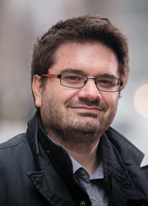 Professor, Director and UNESCO Chair, NRS Centre for Energy,
Professor, Director and UNESCO Chair, NRS Centre for Energy,
Materials and Telecommunications
Email
Phone: 514-228-6906
- Energy and Society: What Type of Energy for the Future of Humanity? (P)
- Survival Skills for Scientists (G)
- Multifunctional Materials and Their Applications in Emerging Technologies (G, S)
Federico Rosei has held the Canada Research Chair (Junior) in Nanostructured Organic and Inorganic Materials between 2003 and 2013. He is Professor and Director of Institut National de la Recherche Scientifique, Énergie, Matériaux et Télécommunications, Université du Québec, Varennes (QC) Canada. Since January 2014 he holds the UNESCO Chair in Materials and Technologies for Energy Conversion, Saving and Storage and since May 2016 he also holds the Canada Research Chair (Senior) in Nanostructured Materials. He received MSc and PhD degrees from the University of Rome “La Sapienza” in 1996 and 2001, respectively. Dr. Rosei’s research interests focus on the properties of nanostructured materials, and on how to control their size, shape, composition, stability and positioning when grown on suitable substrates. He has extensive experience in fabricating, processing and characterizing inorganic, organic and biocompatible nanomaterials. He has published over 250 articles in prestigious international journals (including Science, Nature Photonics, Proceedings of the National Academy of Sciences, Advanced Materials, Angewandte Chemie Int. Ed., Journal of the American Chemical Society, Advanced Functional Materials, Nanoletters, ACS Nano, Biomaterials, Small, Physical Review Letters, Nanoscale, Chem. Comm., Applied Physics Letters, Physical Review B, etc.), has been invited to speak at over 260 international conferences and has given over 200 seminars and colloquia, over 50 professional development lectures and 35 public lectures in 42 countries on all inhabited continents.
His publications have been cited over 8400 times and his H index is 50. He is Fellow of numerous prestigious national and international societies and academies, including: the Royal Society of Canada, the European Academy of Sciences, the World Academy of Art and Science, the American Physical Society, the American Association for the Advancement of Science, SPIE, the Canadian Academy of Engineering, ASM International, the Royal Society of Chemistry (UK), the Institute of Physics, the Institution of Engineering and Technology, the Institute of Materials, Metallurgy and Mining, the Engineering Institute of Canada, the Australian Institute of Physics, Honorary Fellow of the Chinese Chemical Society, Foreign Member of the Mexican Academy of Engineering, Senior Member of the IEEE, Member of the Global Young Academy and Member of the Sigma Xi Society. He has received several awards and honours, including the FQRNT Strategic Professorship (2002–2007), the Tan Chin Tuan visiting Fellowship (NTU 2008), the Senior Gledden Visiting Fellowship (UWA 2009), Professor at Large at UWA (2010–2012), a Marie Curie Post-Doctoral Fellowship from the European Union (2001), a Canada Research Chair (2003–2013), a Friedrich Wilhelm Bessel Award from the Alexander von Humboldt foundation (2011), the Rutherford Memorial Medal in Chemistry (Royal Society of Canada 2011), the Herzberg Medal (Canadian Association of Physics 2013), the Brian Ives lectureship award (ASM international / Canada Council 2013), the Award for Excellence in Materials Chemistry (Canadian Society for Chemistry 2014), the NSERC EWR Steacie Memorial Fellowship (2014), the José Vasconcelos Award for Education (World Cultural Council 2014), the IEEE NTC Distinguished Lectureship 2015, the Lash Miller Award (Canada Section, Electrochemical Society 2015), the Chang Jiang Scholar Award (Government of China), the Khwarizmi International Award from the Iran Research Organization for Science and Technology (IROST), the Recognition for Excellence in Leadership from the American Vacuum Society, the Selby Fellowship from the Australian Academy of Sciences, the John C. Polanyi Award (Canadian Society for Chemistry 2016), the Outstanding Engineer Award (IEEE Canada 2017) and the Sigma Xi Distinguished Lectureship (2018–2021).
Corinna Ross
Associate Professor of Biology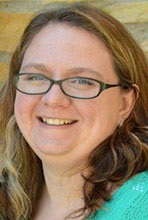
Texas A&M University San Antonio
Email
Phone: 210-784-2227
- The Search For the Fountain of Youth (P, G, S)
- Early Development, Obesity and Aging: What We Can Learn From Monkeys (P, G, S)
- Monkeys and Children and Science Oh My: An Attempt to Balance a Career in Science With Motherhood
Dr. Corinna Ross is an Associate Professor of Biology at Texas A&M University San Antonio and an Associate Professor at the Southwest National Primate Research Center, Texas Biomedical Research Institute. She is a graduate of the University of Nebraska Lincoln (PhD 2005), University of Nebraska Omaha (MA 1999) and Cornell University (BS 1997). She was a postdoctoral fellow at the University of Texas Health Science Center San Antonio, with a fellowship in the Biology of Aging. After joining the faculty at A&M San Antonio she was awarded a Claude D. Pepper Center research fellowship to continue training in translational gerontology. She is currently the Southwest National Primate Research Center Marmoset Colony Administrator, the San Antonio Marmoset Aging Program co-director, and the San Antonio Pepper Center Core co-director. Her research focuses on marmosets, which are small primates, to explore questions in primate behavior and physiology, and translational biomedicine.
Danielle Wood
Assistant Professor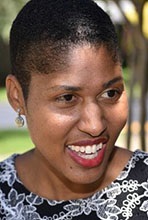
Director of Space Enabled Research Group
Massachusetts Institute of Technology
Email
Web
- Technology from Space Enables Sustainable Development on Earth (P, G, S)
- Designing Complex Systems in Support of Sustainable Development using Systems Architecture (G, S)
- Space Technology for the Development Leader (S)
Professor Danielle Wood directs the Space Enabled Research Group within the MIT Media Lab which seeks to advance justice in Earth's complex systems using designs enabled by space. Prof. Wood is a scholar of societal development with a background that includes satellite design, earth science applications, systems engineering, and technology policy for the US and emerging nations. In her research, Prof. Wood applies these skills to design innovative systems that harness space technology to address development challenges in collaboration with development leaders. Professor Wood’s research also develops systems analysis tools to improve decision making during the design of complex systems. Prior to joining MIT faculty, Prof. Wood worked as the Applied Sciences Manager within the Earth Science Division of Goddard Space Flight Center. Previously, she served as Special Assistant to the Deputy Administrator at NASA Headquarters in Washington, DC. Before working at NASA, Prof. Wood held positions at the Aerospace Corporation, Johns Hopkins University, and the United Nations Office of Outer Space Affairs. Prof. Wood studied at the Massachusetts Institute of Technology, where she earned a PhD in engineering systems, SM in aeronautics and astronautics, SM in technology policy, and SB in aerospace engineering.